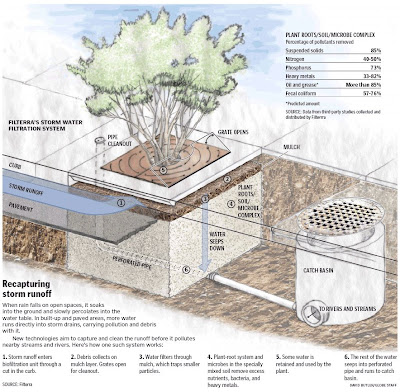Monday, July 21, 2008
The follow-up
Of course, they can be prompted, too.
RETF member Jerry Nolet made some remarks about some proposals, and hinted at the creation of a standing committee. He did say that the work of the RETF "ought to be relegated to a standing committee," however. Chairman Santaniello said that the Select Board will "have a discussion" about setting up an energy committee. Mr. Nolet accepted the language of the task committee report being a "final" report.
[In the world of energy and emerging technologies, I am sure it won't be the final word, however.]
In my remarks during the public comment time, I said that I support the change of the RETF to a standing committee, that it's a first step, and the second step would be for the town to agree to the non-binding Memorandum of Agreement (read it here) in support of the Pioneer Valley Clean Energy Plan. Agreeing with the principles in this plan indicates that we want to save money by saving energy and can even earn us money by raising our Commonwealth Capital Score (a score that helps us be competitive in state grant awarding ).
On June 24, 2008 I received a note from Cindy French, Administrative Assistant to the Select Board that "this item has been put on hold until further notice, per Chair Person Santaniello. I will keep you informed as to when it is placed on a future agenda."
I asked the Chair when the CEP can be taken off the table. The Chair replied that he is working with the town manager on the schedule; when there is an opening he will schedule it.
I met with the Select Board on May 5 to discuss this plan. [They had copies since the start of the year. The minutes of every meeting after May 5 make no reference to working on this.]
I had not heard back from anyone in response to my requests to work with them in discussing their questions about the MOA; PVPC Planner Catherine Miller had also heard nothing back. I have volunteered to speak with SB members on the phone, in person, or during a public meeting. Neither Catherine nor I have received a response...yet--I am an optimist! This policy plan provides ideas and strategies; Longmeadow can pick and choose from lots of ideas; or we can come up with our own....BUT the idea is to sign on to agree with the principles--and in so doing, enable us to compete for state grants more effectively.]
---
More of interest:
Renewable Energy for the Pioneer Valley
PVPC and FRCOG have been funded by the Massachusetts Technology Collaborative to develop a Strategic Plan for Renewable Energy for the Pioneer Valley. As part of this plan we have developed an inventory of renewable energy activities in the Pioneer Valley. The plan will be completed in Summer 2007. The Pioneer Valley Renewable Energy Advisory Committe (PVREC) meets quarterly.
Download PDF inventory of renewable energy activities in the Pioneer Valley
Timeline of plan development and a list of ways that you can get involved
---
Minutes of MAy 5: 7:07 pm Pioneer Valley Planning Commission (PVPC) Clean Energy Plan - PVPC Representative
Catherine Miller, Longmeadow PVPC Alternate Becky Townsend – Ms. Townsend gave a detailed presentation to the Select Board outlining the Memorandum of Agreement for Promoting and Implementing the Pioneer Valley Clean Energy Plan.
The Select Board directed some questions to her and the discussion continued. Select Person Paul Santaniello expressed his concern with signing an “unbinding” document and committing the Town to an agreement that has no specifics. Select Person William Scibelli concurs.
Select Person Kathleen Grady agrees, however; she also understands that by signing the Memorandum, the Town of Longmeadow would be joining a regional effort and would be able to participate in energy conservation efforts on a Regional level, including benefiting from receiving grant monies.
After some discussion it was decided that Catherine Miller, the representative from the PVPC, would attend a future meeting and address the Select Board’s specific concerns. [emphasis mine]
Thursday, July 17, 2008
Save Money-Save Energy-Save the RETF
If you've got a body, you can have a role as an audience member for about 15 minutes at the next Select Board meeting on July 21 at 7:55-8:10 pm (in the Police Dept. Community Room).
CONTEXT:
Longmeadow was one of the first communities in our region to have a task force in place to examine ways to save our town money by conserving energy and reduce our overall need for energy.
This group (the Renewable Energy Task Force, or RETF) served at the direction of the Town Manager. It was scheduled to give a status report highlighting some possible projects & cost savings our town could choose. Their 3-page executive summary is below.
At the next Select Board meeting, this group will request that the Select Board create a standing Commission so that their hard work can continue.
PROBLEM:
The reason WHY the RETF needs to be formed as a standing committee is because the Town Manager has found it necessary to disband the energy task force.
-Longmeadow still does not have renewable energy systems in place.
-We still can save money.
-The Commonwealth's new Green Communities Act is a source of funds for communities that are proactive in this area.
-Even the Select Board themselves "directed the Town to develop a local action plan for sustainability in conformance with ICLEI’s Cites for Climate Protection Campaign and this responsibility was added to the RETF."
ACTION:
Please join me in sitting in on the audience (if you wish you can speak at the public comment time at the start of the meeting, 7pm). All you need to do is show up, so that the Renewable Energy Task Force can point to your support as additional justification for continuing their efforts.
If you are unable to come to the meeting, please email your support to townhall@longmeadow.org &/or contact a Select Board member directly:
Paul P. Santaniello (2009) Chair Person
Robert Barkett, (2011) Vice-Chair Person
William G. Scibelli (2010) Clerk
Kathleen E. Grady (2009) Member
Brian M. Ashe (2010) Member
Thanks for your consideration of this effort. With the rising prices for oil and gas, our town would be incredibly short-sighted to disband the renewable energy task force.
TO: Robin Crosbie, Town Manager
The Town of Longmeadow Select Board
FROM: Renewable Energy Task Force (RETF)
RE: EXECUTIVE SUMMARY STATUS REPORT
DATE: July 21, 2008
Convening History and Purpose:
Charge: In May of 2007, Robin Crosbie, Town Manager, convened a task force to study and recommend options for renewable energy use for the town that would help the town reduce its reliance of non-renewable energy sources such as oil and gas and improve economic efficiencies for the town. In November of 2007, the Select Board directed the Town to develop a local action plan for sustainability in conformance with ICLEI’s Cites for Climate Protection Campaign and this responsibility was added to the RETF..
REVIEW OF CURRENT WORK:
RETF focused its initial work on energy conservation and the study of existing renewable energy sources, with energy conversation opportunities given top priority. RETF determined that the most practical renewable energy source for Longmeadow is the solar panel/photovoltaic source. Because there is extremely limited wind source in the Pioneer Valley, the use of wind power is not appropriate. During this past year, RETF has begun work on four distinct projects that will have the immediate result of conserving energy and demonstrating the use of solar power for energy needs. Listed on the next page is an overview of these four projects; including anticipated costs and savings and, where appropriate, rebate information.
RETF RATIONAL FOR PROJECT RECOMMENDATIONS:
The field of energy conservation and renewable energy is one that is in current flux. By that it is meant that as of today there are new technologies available to help with conservation and implementation of non-fossil fuel energy sources. The field is one where both policy and research are creating changes in real time. The challenge for any municipality is to find the current best practices and make reasoned decisions for its residents and businesses, all the while recognizing that these cannot be static decisions; they must be re-evaluated at different points in time to make sure that changes capture best practices as the field evolves.
RECOMMENDATIONS FOR TOWN MANAGER AND SELECT BOARD:
1) The four projects listed on the next page are recommended by the RETF for the town’s benefit. Taken as a whole, they begin to help the town realize significant reductions in energy use and save dollars and improve efficiencies.
Note: The work on the local action plan for sustainability is just beginning.
2) The RETF has been working for approximately one year now. In a relatively short period of time it is clear that it has begun finding ways for Longmeadow to save significant dollars through energy conservation. At this point, to continue its work, to help build more public awareness and gain community support, and to be ready to benefit from the new Green Communities Act (S.2768) in which municipalities will be able to receive financial assistance for energy conservation for its work, the RETF is requesting that the Select Board formally the acknowledge the importance of this work and create and an Energy Commission that will be opened to the public for greater participation and allow the current RETF members to continue their work on behalf of Longmeadow.
RENEWABLE ENERGY TASK FORCE RECOMMENDED PROJECTS
| PROJECT NAME | TRAFFIC LIGHT LED CONVERSION | INSULATION OF HIGH SCHOOL NATATORIUM | TOWN STREET LIGHTS: PURCHASE | SOLAR POWER DEMONSTRATION PROJECT |
| Project description | Install LED bulbs in all traffic lights in town | Insulation of exposed walls of high school swimming pool. | The town currently rents the street lights from WMECO. George Woodbury has been hired as a consultant to create a complete inventory and map all existing street lights, with the goal of determining their condition and appraisal for purchase so that Longmeadow reduces its monthly utility costs and assumes responsibility for maintenance. | Installation of 10 kilowatt solar/photovoltaic (PC) array on Glenbrook Middle School Roof: This project shall serve 2 purposes: (A): Develop experience with solar renewable energy; and (B): Demonstrate to both students and residents the manner in which this type of energy source works to help further knowledge of science and technology. Project includes a web-based monitoring system for continual data accessibility. (C): provide electric power to supplement the needs of the middle school. |
| Pre- Conversion Energy Costs | $18,000 per year | Approximately $39,000 per year | Approximately $213,000 per year | |
| Energy Costs after improvement | $3600 per year (approximately 80% annual savings) | Approximately $23,000 (estimated 41% annual savings) | Mr. Woodbury has done this work in other towns and has helped them realize significant savings: potential estimated savings of $100,000 per year | Currently GMS uses about 300,000 KWH per year. This system would provide approximately 4% of total load: about 11,475 KWH per year. |
| Project Conversion Costs (including rebate information) | $45,000 -18,000 (WMECO rebate) $27,000 (out of pocket for town) | Anticipated project cost $24,000-35,000 | Purchase of lights: $100,000-$175,000 | $82,712.22 -39,520.00 (MTC rebate) $43,192.22 |
| Rate of Return on Investment | 2 years | 1.5 to 2.2 years | Not known: however anticipated 2 years | 13.7 years |
| Project Status | Completed in March, 2008 | This project is still being developed. | Initial inventory and mapping is completed. | The development of this project is complete and awaiting Town approval. |
Wednesday, July 2, 2008
Sunday, April 6, 2008
Land and Water
Measures being considered and tested by local communities include:
* Tree and bush planters that act both as water-retention tanks and natural pollution filters.

* So-called "bio-swales" and other engineered wetlands that trap water and use specially selected soil mixes and plant species to remove pollutants and return storm water into the local water table.
Underneath, however, they are radically different. Storm water is directed into the base of the planter through a cut in the curb, where it first enters a layer of specially developed mulch that traps trash and large debris on the surface, so that it can be collected by town workers. The mulch also traps smaller particles of debris and pollution.
The city also installed at the mall storm-water settlement basins that use sand as a filtering agent, and is working on plans to uncover and restore a nearby brook that for decades has been buried underground in a culvert, Rose said."
Wednesday, March 26, 2008
Go green with solar panels
"Taking advantage of the Commonwealth Solar Energy Program, a local self storage and moving company will soon install solar paneling to its River Street business.
Storage Plus owner Conrad Watson said installation should cost close to $45,000, but will save him close to $5,000 a year in energy costs. The Weston resident said his company will not foot the entire bill. Storage Plus received a $19,240 state rebate for installing the paneling through a program offered by the Massachusetts Renewable Energy Trust.
The rebate is part of Gov. Deval Patrick's recent streamlining of the state's solar energy program, Watson said. The program allows an easy process and hefty rebate for installing solar paneling."
Now more of that would be a nice corrective to the Falling Behind report (see below).
The MRET seeks to "The Renewable Energy Trust seeks to maximize environmental and economic benefits for the Commonwealth’s citizens by pioneering and promoting clean energy technologies and fostering the emergence of sustainable markets for electricity generated from renewable sources." Their website contains very handy and easy-to-use tables with programs suiteed for businesses, individuals, communities, and more....
(Thanks M. for pointing the article out!)
Falling Behind
 "Nothing against Richmond or Atlanta, but they don't have sugar maple trees," Rock said. In addition to killing off trees the maple sugar industry depends on, rising temperature would also threaten the region's outdoor winter sports, fall foliage colors and timber industry, Rock said."
"Nothing against Richmond or Atlanta, but they don't have sugar maple trees," Rock said. In addition to killing off trees the maple sugar industry depends on, rising temperature would also threaten the region's outdoor winter sports, fall foliage colors and timber industry, Rock said."the increase. Electricity consumption grew faster in Massachusetts than in any other state at 9 percent over the period."
consumption between 2001 and 2005."
"In Massachusetts, rising oil prices led many homeowners to conserve heating oil, or
even convert to heating systems fueled by natural gas, leading to a large fall in heating
oil emissions in the state, and only a small increase regionwide."
